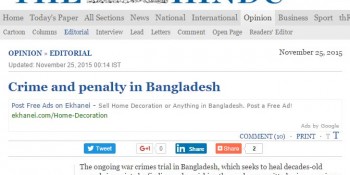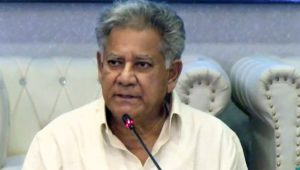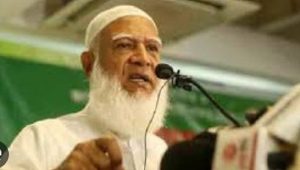যুদ্ধাপরাধীদের ফাঁসি দিয়ে দুর্বল হয়ে পড়ছে সরকার !
প্রকাশ: ২০১৫-১১-২৫ ২২:০৪:১৪

 ভারতের প্রভাবশালী হিন্দু পত্রিকার এক সম্পাদকীয়তে বলা হয়েছে, যুদ্ধাপরাধের দায়ে ফাঁসি কার্যকর করে আওয়ামী লীগ সরকার আরো দুর্বল হয়ে পড়ছে। সম্পাদকীয়তে বলা হয়, ১৯৭১ সালের ওই বিয়োগান্তক ঘটনায় সরকার ফাঁসি না দিয়ে যাবজ্জীবন কারাদ- দিয়ে এ অধ্যায়ের সমাপ্তি টানতে পারে।
ভারতের প্রভাবশালী হিন্দু পত্রিকার এক সম্পাদকীয়তে বলা হয়েছে, যুদ্ধাপরাধের দায়ে ফাঁসি কার্যকর করে আওয়ামী লীগ সরকার আরো দুর্বল হয়ে পড়ছে। সম্পাদকীয়তে বলা হয়, ১৯৭১ সালের ওই বিয়োগান্তক ঘটনায় সরকার ফাঁসি না দিয়ে যাবজ্জীবন কারাদ- দিয়ে এ অধ্যায়ের সমাপ্তি টানতে পারে।
জামায়াতে ইসলামী নেতা আলী আহসান মোহাম্মদ মুজাহিদ এবং বিএনপি নেতা সালাউদ্দিন কাদের চৌধুরীর ফাঁসি কার্যকর নিয়ে বুধবার ‘ক্রাইম অ্যান্ড পেনাল্টি ইন বাংলাদেশ’ শিরোনামে সম্পাদকীয়টি ছাপা হয়।
এতে বলা হয়, ‘যুদ্ধাপরাধীদের শাস্তি দিতে আওয়ামী লীগ সরকার যা সম্ভব করার ব্যাপারে যে অঙ্গীকারবদ্ধ তাতে তেমন কোনো সন্দেহ নেই। তবে বিচারে মৃত্যুদ- দিয়ে এ অবস্থান দুর্বল হয়ে পড়েছে। নৈতিক দিক থেকে দেখলে মুত্যুদ- দিয়ে বাংলাদেশ সরকার চরমপন্থীদের বিরুদ্ধে তার লড়াইয়ে প্রকৃতপক্ষে দুর্বল হয়ে পড়ছে।
বিচার প্রক্রিয়ার মাধ্যমে ন্যায়বিচারের পরিবর্তে প্রতিশোধ নেয়ার রঙ ছড়াচ্ছে, যা (ন্যায়বিচার) হওয়া উচিত রাষ্ট্রীয় আইনি কাঠামোর ভিত্তি।
অন্যদিকে এমন সময় এসব ফাঁসি কার্যকরের ঘটনা ঘটছে যখন বাংলাদেশ ইসলামী মৌলবাদের সমস্যায় জর্জরিত। শেখ হাসিনার সরকার যদি মনে করে যে এসব ফাঁসির মাধ্যমে বাংলাদেশে ইসলামী রাজনীতি দুর্বল হয়ে পড়বে, ভবিষ্যতে তা ভুলই প্রমাণিত হতে পারে।
সরকার বিরোধীদের ব্যাপারে যে কঠোর অবস্থান নিয়েছে তাতে বিরোধীদের প্রতি সহানুভূতিশীলদের মধ্য থেকে উগ্রপন্থীরা সদস্য নিয়োগ দিতে পারে। বাংলাদেশের সাম্প্রতিক ঘটনাপ্রবাহে মনে হচ্ছে এটা ইতোমধ্যেই ঘটছে।
সরকারের কঠোর অবস্থান এবং নেতাদের ফাঁসির ঝোলানো সত্ত্বেও দেশের বৃহত্তম ইসলামপন্থী দল জামায়াতে ইসলামী এখনো সাংগঠনিকভাবে শক্তিশালী এবং বাংলাদেশে ইসলাম প্রতিষ্ঠাকে তাদের ‘প্রতিশোধ’ হিসেবে ঘোষণা দিয়েছে।
অধিকন্তু যুদ্ধাপরাধীদের ফাঁসি কার্যকর আরম্ভ হওয়ার পর থেকেই বাংলাদেশে যে সেক্যুলার লেখক ও তাদের প্রকাশকদের ওপর হামলা বেড়েছে, তা কাকতালীয় নাও হতে পারে। অন্যকথায় সরকার যে বর্তমানের পরিবর্তে অতীতের বিচারের ব্যাপারে মনোযোগী সেই বৈপরীত্যও প্রকট হয়ে উঠেছে।
ঢাকার সামনে এখন বিরাট চ্যালেঞ্জ। তাকে নিশ্চিত করতে হবে যে স্বাধীনতা যুদ্ধের সময় সংঘটিত মানবতাবিরোধী অপরাধের বিচার যেমন করতে হবে, পাশাপাশি ইসলামী শক্তি যেন এই প্রক্রিয়ার সুযোগ নিয়ে লাভবান হতে না পারে তা তাও রোধ করতে হবে। যুদ্ধাপরাধীদের বিচারের মাধ্যমে যাবজ্জীবন কারাদ- দিয়ে তারা এই বিয়োগান্তক ঘটনার সমাপ্তি টনাতে পারে। মুত্যদ-ের ওপর নির্ভরশীলতা কাম্য নয়।’
নিচে দ্য হিন্দুর সম্পাদকীয়টি হুবহু তুরে ধরা হল-
Crime and penalty in Bangladesh
The ongoing war crimes trial in Bangladesh, which seeks to heal decades-old wounds in society by finding and punishing those who committed grievous crimesduring the country’s liberation war in 1971, has invited applause and also raised concerns. After more than 40 years of independence, justice is finally being seen to be done as the Sheikh Hasina government took it upon itself to see the trials through. These crimes remained unresolved all these years because of Bangladesh’s complex post-liberation history. That the past is unresolved is still seen in the present, as the fundamentalists and even the Pakistan government have opposed the trials and the subsequent punishment. The secular civil society, on the other hand, has put pressure on the government to carry forward the trial and punish the war criminals. This contradiction was on display once again when two convicted war criminals — Ali Ahsan Mohammad Mujahid of the Jamaat-e-Islami and Salauddin Quader Chowdhury of the Bangladesh Nationalist Party — were hanged on Sunday.
While there’s little doubt that the Awami League government is committed to doing what it can to punish the war criminals, what acts as a dampener is its embrace of the death penalty as a means to bring in justice. From a moral standpoint, executions actually weaken the Bangladesh government’s position in its struggle with the extremists. It gives the trial proceedings the colour of revenge rather than the conviction of justice, which should be the basis of a state’s legal system. On the other side, these executions happen at a time when Bangladesh is grappling with the problem of Islamist fundamentalism. If the Sheikh Hasina government thought that these hangings would weaken the Islamist politics in Bangladesh, it could well be proved wrong in the long run. The hard-line position the government is taking against the opposition could help extremist groups recruit followers from among embittered opposition sympathisers. Recent incidents in Bangladesh show that it is already happening. Despite the government’s tough position and the hanging of its leaders, Jamaat-e-Islami, the country’s largest Islamist party, is still organisationally strong, and has vowed to “take revenge” by “establishing Islam in Bangladesh”. Further, it may not be a coincidence that attacks against secular writers and their publishers have been on the rise ever since the execution of war criminals started. In other words, the government’s position has sharpened the contradictions of the present rather than redressing the injustices of the past. The challenge before Dhaka is huge. It has to ensure that those who committed crimes against humanity during the war are brought to justice, while at the same time preventing Islamist forces from using that process to their benefit. By bringing the war criminals to trial and punishing them to life imprisonment, they could have brought the tragic events to a just closure, but relying on the death penalty dampens the otherwise welcome process.
সানবিডি/ঢাকা/রাআ











 সানবিডি২৪ এর সর্বশেষ খবর পেতে Google News ফিডটি ফলো করুন
সানবিডি২৪ এর সর্বশেষ খবর পেতে Google News ফিডটি ফলো করুন











